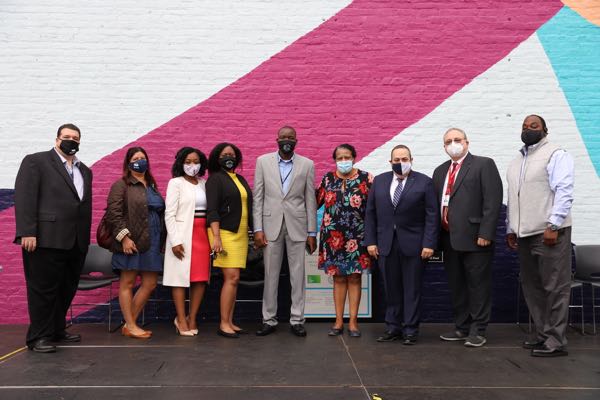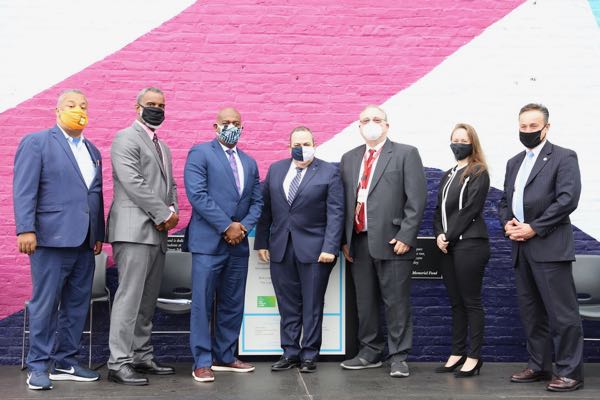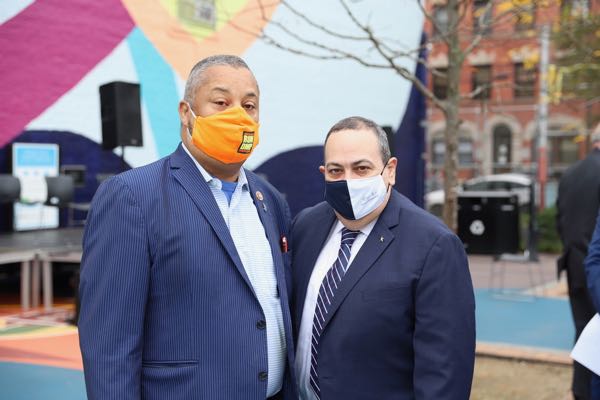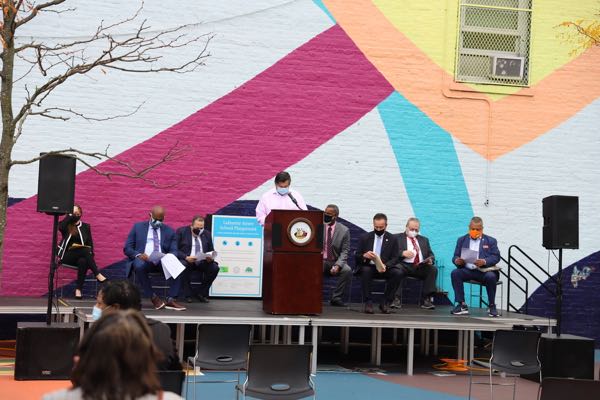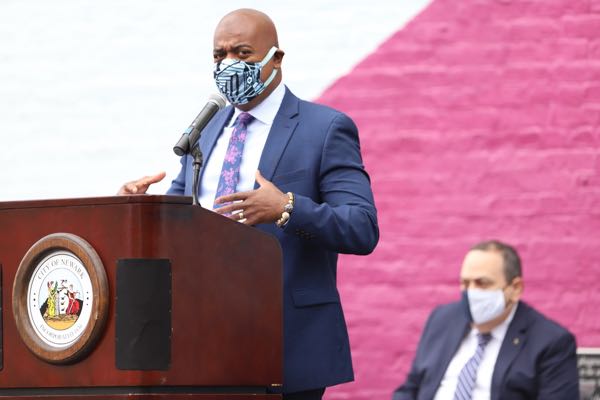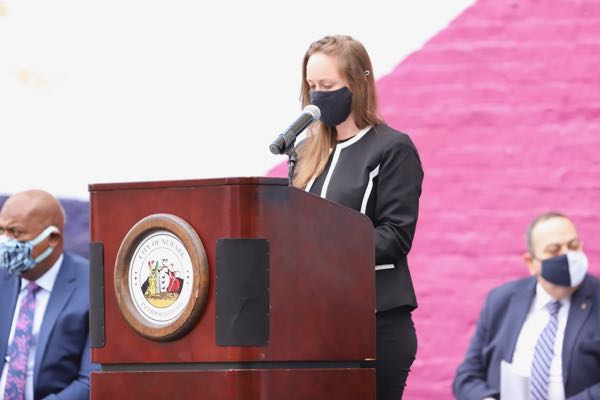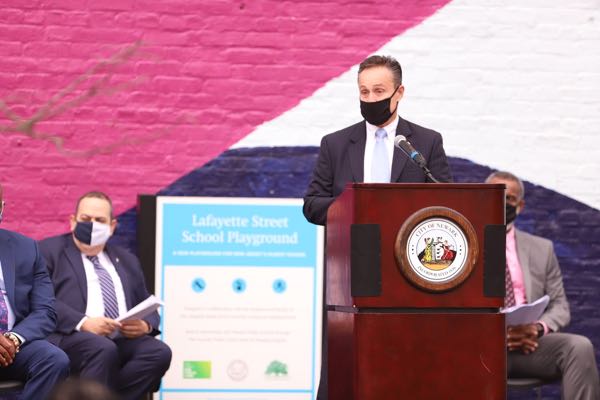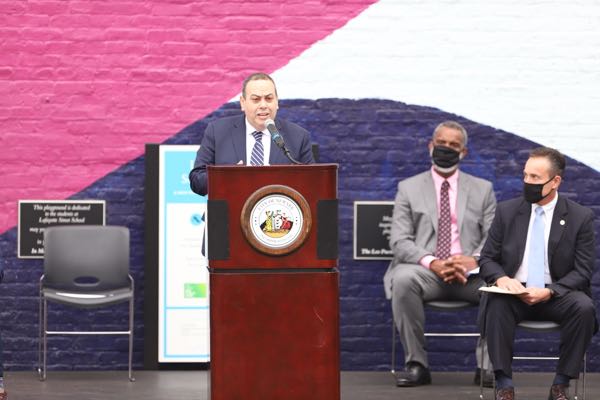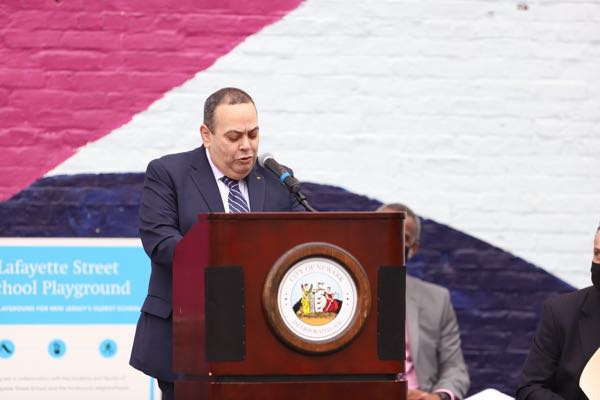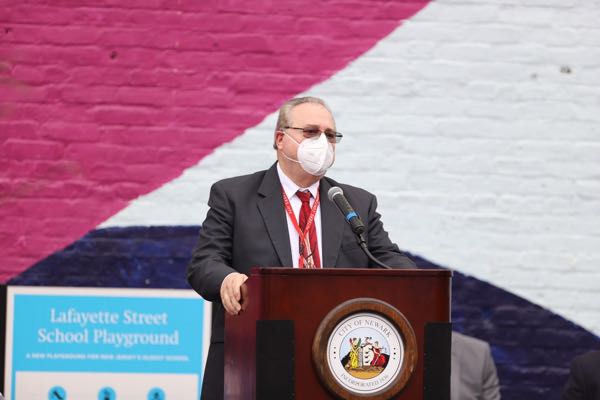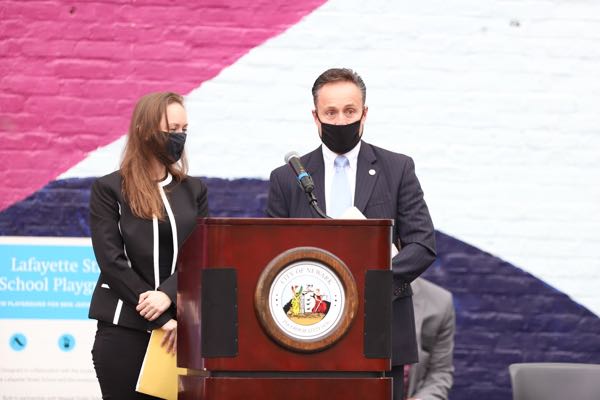$39.9 Million Announced Nationwide will Fund Projects to Protect Children in Disadvantaged Communities and Schools from Exposure to Lead in Drinking Water
[Newark, NJ] Today, U.S. Environmental Protection Agency (EPA) Region 2 Administrator Pete Lopez and EPA’s Office of Water Senior Policy Counsel Jessica Kramer were joined by Newark Mayor Ras Baraka and Newark Schools Superintendent Roger León, Newark Board of Education President Josephine C. Garcia, Congressman Donald M. Payne, Jr. and other dignitaries to announce that the Newark (New Jersey) Board of Education was selected to receive nearly $7.5 million in federal funds to combat lead in Newark schools. This grant will help fund the Newark Safe Water Initiative, which improves public health by reducing sources of lead in school drinking water to benefit more than 36,000 students in pre-Kindergarten through 12th grade and nearly 6,000 employees in 64 schools.
“Today’s announcement provides another example of the Trump Administration’s leadership in helping to ensure that all American’s have safe drinking water,” said EPA Region 2 Administrator Pete Lopez. “As part of the newly formed Water Subcabinet, EPA and its federal partners will continue protecting the nation’s waters to benefit public health and the environment while creating jobs and spurring economic development.”
In advance of next week’s National Lead Poisoning Prevention Week, EPA is making the first-ever selections under the Water Infrastructure Improvements for the Nation (WIIN) Act’s Reduction in Lead Exposure via Drinking Water by announcing $39.9 million in grant funding for ten projects. EPA anticipates that it will award the Newark Board of Education a grant of about $7.5 million once all legal and administrative requirements are satisfied. The Board of Education will use the EPA grant funding to remove sources of lead in drinking water in schools, including addressing lead pipes and fixtures. The project will also include outreach and public education to raise awareness of the health effects of lead in drinking water and ways to reduce lead exposure.
“Last year, EPA worked hand in hand with the city of Newark and the New Jersey Department of Environmental Protection to help ensure that the city’s drinking water was safe,” said EPA’s Office of Water Senior Policy Counsel Jessica Kramer. “We are glad to be back in Newark today, acknowledging the great work the city is doing to protect public health and announcing this EPA grant funding that will directly help reduce lead in schools.”
“We are thankful for the EPA’s grant to further support our work to protect Newark families and children from the dangers of lead exposure. The City of Newark is near completion of replacing all of our lead service lines to homes throughout the city,” said City of Newark Mayor Ras J. Baraka. “With significant infrastructure investments and an unwavering priority of securing our community’s health, safety and quality of life, we remain committed to delivering the purest water possible to our residents.”
“The EPA has been a great partner in helping us identify and correct the lead leachates in our service lines,” said Kareem Adeem, the Director of Newark's Water and Sewer Department. “This grant to our Board of Education furthers their partnership and our commitment to eradicate lead from leaching into our drinking water.”
“The Newark Safe Water Initiative completes a full remediation, provides new service lines and fixtures through strategic planning, sampling, and testing, and sustains the water filtration system in schools that have been remediated,” said Superintendent Roger León. He added, “By achieving the objectives of this project because of the EPA and with the city of Newark’s support, we will have an increased number of drinking water fixtures, fountains, outlets, and plumbing in schools.”
“Every American should have access to safe, clean drinking water, and this federal funding takes another important step towards making that a reality for Newark’s children,” said U.S. Senator Cory Booker, who authored a law delivering tens of millions of dollars in funding to address the lead crisis in communities like Newark. “Residents of Newark, including myself, are counting on the federal government to remedy this environmental injustice and protect our children. I was proud to fight for this funding in the WIIN Act to ensure critical protections to public health are in place while making long-overdue investments in our aging infrastructure and boosting economic development.”
“I was extremely pleased to hear about the $7.5 million EPA grant to support the Newark Safe Water Initiative and provide cleaner drinking water in the city’s schools,” said Congressman Donald M. Payne, Jr. “I have been working to get federal assistance for Newark’s water issues for years and trying to provide clean drinking water to all American schoolchildren through bills, such as my TEST for Lead Act. This is a great day for the city, and I want to thank the EPA for recognizing the need for such funding in Newark.”
“I am pleased to hear the Newark Board of Education is receiving this much needed grant funding that will help make drinking water at Newark public schools safer,” said Congressman Albio Sires. “This funding, which comes as part of the EPA’s Water Infrastructure Improvements for the Nation Act grant program, will be instrumental in addressing conditions that contribute to increased levels of lead in drinking water at Newark public schools. As a Senior member on the House Transportation and Infrastructure Committee, I will continue to fight to ensure everyone has access to clean drinking water.”
“We are grateful to the City of Newark and the EPA for their partnership in reducing lead in drinking water, especially for Newark’s schoolchildren,” said New Jersey Department of Environmental Protection Commissioner Catherine R. McCabe. “Throughout New Jersey and the entire country, sources of lead in our water infrastructure must be remediated to reduce the risk of lead exposure from drinking water. Newark has proven to be a national leader in reducing lead risk. Today’s announcement demonstrates that reducing lead exposure requires a coordinated effort at the federal, state and local levels to better protect public health.”
In addition to announcing these WIIN Act grants, EPA is helping finance projects that remove sources of lead in drinking water through the new and innovative Water Infrastructure Finance and Innovation Act (WIFIA) loan program and through the State Revolving Funds. Under the Water Infrastructure Fund Transfer Act (WIFTA), New Jersey made a one-time transfer of approximately $113 million from the state’s Clean Water State Revolving Fund to its Drinking Water State Revolving Fund (DWSRF) for lead abatement, DWSRF-eligible projects.
Background
The 2016 Water Infrastructure Improvements for the Nation Act (WIIN Act) addresses, supports, and improves America's drinking water infrastructure. Included in the WIIN Act are three drinking water grants that promote public health and the protection of the environment. Since 2018, EPA has made available more than $69 million to support testing for lead in drinking water at schools and childcare programs and $42.8 million to assist public water systems in underserved, small, and disadvantaged communities meet Safe Drinking Water Act requirements.
For more information, please visit: https://www.epa.gov/safewater/grants
Follow EPA Region 2 on Twitter: http://twitter.com/eparegion2
Follow EPA’s Facebook page: http://facebook.com/eparegion2
